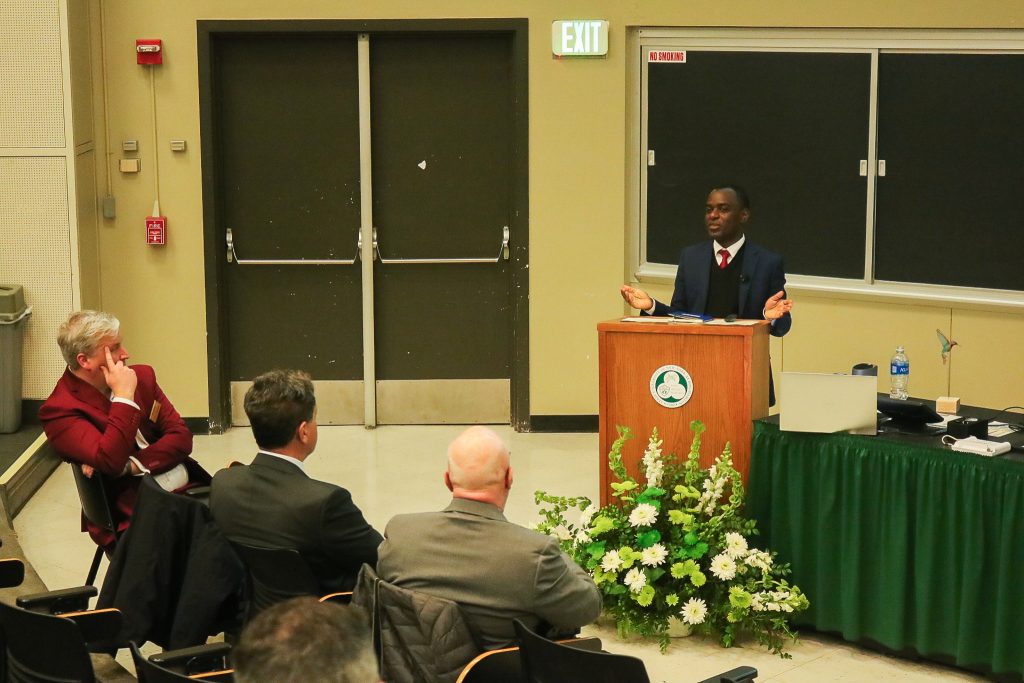Activist Frank Mugisha highlighted his experiences advocating for the rights of LGBTQ+ Ugandans during the second-annual Nadia Rubaii Memorial Prize lecture.
The annual talk, held by the Institute for Genocide and Mass Atrocity Prevention (I-GMAP), was held in memory of Nadia Rubaii, a former professor of public administration and founding co-director of the I-GMAP program. The memorial prize is awarded to individuals exhibiting exceptional “courage, compassion and curiosity” in the atrocity prevention field. Donald Hall, the provost and executive vice president for academic affairs, hosted the keynote address and award ceremony.
In his opening remarks, Hall encouraged guests and University community members to pay tribute to Rubaii’s legacy, saying that despite her untimely passing several years ago, her influence continues to resonate within the institution and beyond, shaping the values and ethos of I-GMAP. )
Max Pensky and Kerry Whigham, both I-GMAP co-directors, spoke on behalf of the organization. They welcomed Mugisha as this year’s prize recipient. Mugisha is a Ugandan LGBTQ+ advocate and executive director of Sexual Minorities Uganda (SMUG) and SMUG International, an organization that advocates for LGBTQ+ Ugandans. A recipient of the Robert F. Kennedy Human Rights Award and the Thorolf Rafto Memorial Prize, Mugisha has been internationally recognized for his activism and was nominated for the Nobel Peace Prize in 2014.
“It comes as no surprise that [Mugisha] is at the forefront, a very physically dangerous place of organized opposition to the anti-homosexuality act,” Whigham said. “For years he’s been among the most visible, persistent and dedicated defenders of human rights in his country.”
In 2011, a national newspaper published the names of 100 gay and lesbian activists, including David Kato, a former SMUG founder and one of Mugisha’s close friends who was murdered in his home. After his death, Mugisha became executive director, a post he still holds. He has withstood intimidation, arrests and countless threats, and has ensured that his organization survives and that LGBTQ+ Ugandans know that they are seen, valued and defended.
In 2014, the Ugandan government passed an anti-homosexuality bill that severely criminalized homosexuality and same-sex marriages. The death penalty was recently imposed for “serial offenders” of the law, leading many countries, including the United States, to formally denounce the law.
When asked how he was able to build such an impactful LGBTQ+ advocacy organization, Mugisha highlighted both resilience and communal organizing.
“I’ve been asked that question a lot.” Mugisha said. “I think it’s resilience — it’s the fact that we’ve been under attack so much that we’ve been able to build a strong community. We started building [SMUG] when there wasn’t so much presence of social media, so we relied on communal organizations, and I think we took the strength from that.”
After his speech, a Q&A session was held, inviting guests to ask Mugisha questions about his work and beliefs. One attendee asked him to discuss SMUG in its current form, since it has been shut down in the past. Mugisha said SMUG is an ideology, not an organization, and his reply to the government was “what are you shutting down?”
In addition to Mugisha’s lecture, held in Lecture Hall II, I-GMAP hosted seven other panelist discussions on Friday and Saturday in the Binghamton University Downtown Center. Topics ranging from online election misinformation to a comparative discussion of current genocide cases before the International Court of Justice were featured at these talks.
Abigail Connors, a sophomore majoring in philosophy, politics and law, shared what she took away from Mugisha’s keynote speech.
“I found it really impactful to listen to Mugisha discuss his advocacy work and the work that his organization has done to fight for LGBTQ+ rights in Uganda, especially in response to such an egregious law,” Connors wrote. “We learn about this kind of work often in the classroom. Mugisha is a great example of how that can be translated to make a difference in the real world.”



